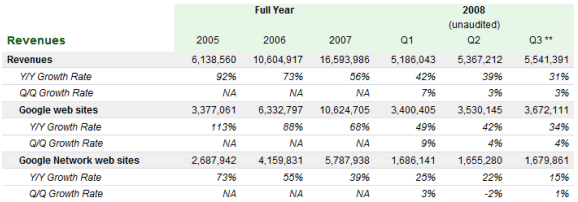"For much of its 10-year history, Google spent money at a pace that was the marvel of Silicon Valley. It hired by the thousands and dished out generous perks, including three free meals a day, free doctors, ski trips and laundry facilities, and subsidized personal trainers. It let engineers spend 20% of their time pursuing pet projects."

But Google's revenue growth has slowed down, the stock is now at less than $300 and Google is not invulnerable to the economy crisis. That means Google must act more responsibly and start to find more safe bets. Google says that it wants to "prioritize our resources and focus more on our core search, ads and apps business." That's the official explanation for closing Lively and for ending the agreement with Yahoo for providing search ads.
"We have to behave as though we don't know" what's going to happen, says Google Chief Executive Eric Schmidt. The company will curtail the "dark matter," he says, projects that "haven't really caught on" and "aren't really that exciting." He says the company is "not going to give" an engineer 20 people to work with on certain experimental projects anymore. "When the cycle comes back," he says, "we will be able to fund his brilliant vision."
Google will encourage less experimentation, we'll see fewer projects that aren't related to Google's main services and it's less likely than ever to see GDrive, the online storage service that requires a lot of resources. The top priorities seem to be display ads, mobile ads and Google Apps, projects that could increase Google's revenues.
It's disappointing to see that Google, an engineering-driven company that used to be focused on building great products that don't necessarily bring money, is now forced to changed its goals and become more profit-driven. Hopefully, this is not the end of Google as we know it.
Here are some interesting extract from the IPO letter sent by Google's founders to investors in 2004:
Our goal is to develop services that significantly improve the lives of as many people as possible. In pursuing this goal, we may do things that we believe have a positive impact on the world, even if the near term financial returns are not obvious. For example, we make our services as widely available as we can by supporting over 90 languages and by providing most services for free. (...) Many companies are under pressure to keep their earnings in line with analysts' forecasts. Therefore, they often accept smaller, predictable earnings rather than larger and less predictable returns. Sergey and I feel this is harmful, and we intend to steer in the opposite direction. (...) Our long term focus does have risks. Markets may have trouble evaluating long term value, thus potentially reducing the value of our company. Our long term focus may simply be the wrong business strategy. Competitors may be rewarded for short term tactics and grow stronger as a result.
Google has had adequate cash to fund our business and has generated additional cash through operations. This gives us the flexibility to weather costs, benefit from opportunities and optimize our long term earnings. For example, in our ads system we make many improvements that affect revenue in both directions. These are in areas like end user relevance and satisfaction, advertiser satisfaction, partner needs and targeting technology. We release improvements immediately rather than delaying them, even though delay might give "smoother" financial results. You have our commitment to execute quickly to achieve long term value rather than making the quarters more predictable. (...)
We will not shy away from high-risk, high-reward projects because of short term earnings pressure. Some of our past bets have gone extraordinarily well, and others have not. Because we recognize the pursuit of such projects as the key to our long term success, we will continue to seek them out. For example, we would fund projects that have a 10% chance of earning a billion dollars over the long term. Do not be surprised if we place smaller bets in areas that seem very speculative or even strange when compared to our current businesses.
No comments:
Post a Comment